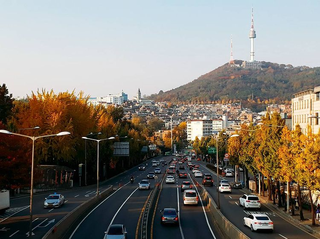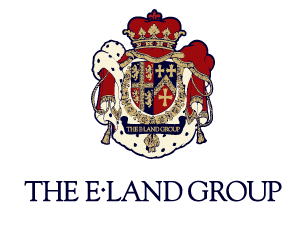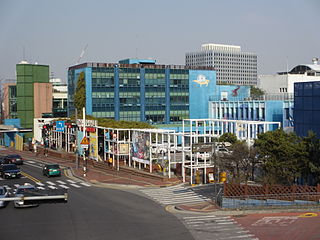
Gimpo is a city in Gyeonggi Province, South Korea. It borders Incheon, with which it shares the South Korean side of the Han River estuary, as well as Seoul and the lesser cities of Paju and Goyang. North Korea is across the Han River. The current mayor is Jeong Hayoung. The city's population of more than 300,000 is made up of more than 71,000 households.

Gyeonggi Province is the most populous province in South Korea.

Gwacheon is a city in Gyeonggi Province, South Korea. It lies close to Seoul in the heart of the Seoul National Capital Area, and also lies just east of Anyang. Seoul Subway Line 4 passes through the city.

Gwangmyeong is a city in Gyeonggi Province, South Korea. It borders Seoul to the east, north and northeast, Anyang to the southeast, Siheung to the southwest, and Bucheon to the northeast.

Seongnam is the fourth largest city in South Korea's Gyeonggi Province after Suwon and the 10th largest city in the country. Its population is approximately one million. Seongnam is a satellite city of Seoul. It is largely a residential city located immediately southeast of Seoul and belongs to the Seoul Capital Area.

Siheung is a city in Gyeonggi Province, South Korea. The city has a population of 511,807 people, where 508,646 are residents out of 218,846 households as of August 2021. Siheung acquired its current administrative structure on January 1, 1989, the former Siheung County was divided into the cities of Siheung, Gunpo, and Uiwang. At the time, Siheung had a population of only 93,000. This number more than tripled in the following decade as massive suburban apartment complexes were developed. Today's Siheung city area formerly belonged to Incheon and Ansan before 1914.

Yongsan District is one of the 25 districts of Seoul, South Korea.

Munhwa Broadcasting Corporation is one of the leading South Korean television and radio broadcasters. Munhwa is the Sino-Korean word for "culture". Its flagship terrestrial television station MBC TV broadcasts as channel 11.

The Ministry of Environment is the South Korea branch of government charged with environmental protection. In addition to enforcing regulations and sponsoring ecological research, the Ministry manages the national parks of South Korea. Its headquarters is in Sejong City.

E·Land Group (Korean: 이랜드그룹) is a South Korean conglomerate headquartered in Changjeon-dong Mapo-gu Seoul, South Korea. E-Land Group takes part in retail malls, restaurants, theme parks, hotels, and construction businesses as well as its cornerstone, fashion apparel business. It has operations worldwide through its subsidiary E-Land World.

Guro District (Guro-gu) is a district of Seoul, South Korea, which was separated from Yeongdeungpo District on April 1, 1980. Located in the southwestern part of the city, where besides Yangcheon District and Geumcheon District Guro District has an important position as a transport link which contains railroads, land routes from the rest of Seoul to the south of the country. The Gyeongbu and Gyeongin railway lines connect Seoul to Busan and Incheon. In addition, Seoul Metropolitan Subway lines 1, 2, and 7, and major highways intersect in Guro District.
Universal Studios South Korea was a proposed Universal Studios theme park in the vicinity of Hwaseong, South Korea. Originally scheduled to open in 2020, a bid for the project was won by a Universal Studios Korea consortium in December 2015, led by China's largest state-run builder, China State Construction Engineering Corporation, and its largest state-run tourist agency, China Travel Services. K-Water, the owner of the project site, oversaw bidding. The consortium also includes the Korean construction firm Daewoo E&C and Korean engineering consulting firm Dohwa Engineering as well as Universal Studios Korea Property Holdings.

Seoul, officially Seoul Special City, serves as the capital of South Korea, and is its most extensive urban center. The broader Seoul Capital Area, encompassing Gyeonggi province and Incheon metropolitan city, emerged as the world's fourth largest metropolitan economy in 2014, trailing only Tokyo, New York City, and Los Angeles, hosting more than half of South Korea's population. Although Seoul's population peaked at slightly over 10 million, it has gradually decreased since 2014, standing at approximately 9.97 million residents as of 2020. Seoul is the seat of the South Korean government.

Seojeongni Station is a station in Seojeong-dong, Pyeongtaek, South Korea. Mugunghwa-ho trains running on the Gyeongbu Line stop here. Additionally, services on Seoul Subway Line 1 have been calling at this station since 2005. Its station subname is Kookje College.
Lotte Hotels and Resorts is a South Korean luxury hotel chain operated by Lotte Hotel Co., Ltd., the hospitality arm of Lotte Corporation. The company was founded in May 1973. Starting with the opening of Lotte Hotel Seoul in 1979, luxury chain hotels opened in Jamsil, Busan, Jeju, and Ulsan. The first business hotel, Lotte City Hotel Mapo, opened in April 2009, and the first overseas chain, Lotte Hotel Moscow, opened in June 2010. On December 8, 2011, the second business hotel, Lotte City Hotel Gimpo Airport opened within the Lotte Mall Gimpo Airport complex.
Financial Hub Center (Fn Hub Korea) is the center of the Financial Supervisory Service responsible for assisting the launch and expansion of financial companies' business in South Korea. It was founded in September 2008 under the Act on the Creation and Development of Financial Hubs and has the purpose of promoting Seoul and Busan as major international financial centers in Northeast Asia. The center provides free advice and one-stop services to help financial companies operate successfully in South Korea's vibrant financial market. It also helps South Korean financial companies expand into international markets for global business opportunities.

The Seoul Capital Area or Gyeonggi region, is the metropolitan area of Seoul, Incheon, and Gyeonggi Province, located in north-west South Korea. Its population of 26 million is ranked as the fourth largest metropolitan area in the world. Its area is about 12,685 km2 (4,898 sq mi). It forms the cultural, commercial, financial, industrial, and residential center of South Korea. The largest city is Seoul, with a population of approximately 10 million people, followed by Incheon, with 3 million inhabitants.

Street food in South Korea has traditionally been seen as a part of popular culture in Korea. Historically, street food mainly included foods such as eomuk, bungeo-ppang and tteok-bokki. Street food has been sold through many types of retail outlets, with new ones being developed over time.

The Seoul Animation Center is an animation and cartoon museum and activities center located on the hillside of Namsan in Jung-gu, Seoul. It was established by the Seoul Metropolitan Government in May 1999 to support the South Korean comics and animation industry and later expanded to include games and characters. It is operated and managed by the Seoul Business Agency (SBA) and jointly hosts the Seoul International Cartoon and Animation Festival (SICAF), and other art exhibits and festivals at the center and on nearby Cartoon Street.
Retailing in South Korea consists of hypermarkets, department stores, flea markets, traditional markets, and underground shopping malls. Hypermarkets sell dry goods and groceries, similar to Western supercentres. Traditional markets are also popular throughout South Korea.

















